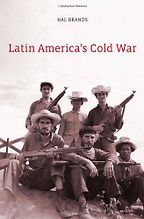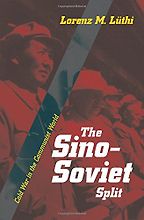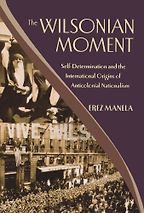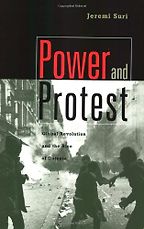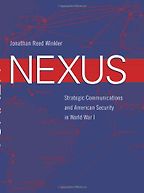Before we talk about your five book choices I wanted to find out a bit more about what made you so interested in studying the Cold War and international relations?
It was an opportunistic choice. I was in graduate school during the late 1960s, when the first American documents on the early Cold War were being declassified. A good dissertation, I thought, should have fresh sources, should be on something significant, and should have the potential to become a book that people might still find useful ten or 15 years into the future. Getting in on the ground floor of Cold War history seemed like a good bet – it was still going on at the time, and very much on everyone’s mind. Beyond that, I wasn’t thinking in any particularly sophisticated way.
Your five books are actually all written by your former students. What do you think your students have been able to teach you?
Part of the fun of being a teacher is that you always learn from teaching. Usually that comes from how you organise and present the materials yourself, but surprisingly often it originates with students – particularly at the graduate level but sometimes also at the undergraduate level in seminars and senior essays. I’m lucky in that there are always new materials for my students to work with in the field of recent international history, not least those that have opened up in the former Soviet Union, Eastern Europe, China and elsewhere since the Cold War ended. It’s also important, though, that the students are of a new generation, and that in itself brings different perspectives from my own. The result is new angles of vision on some old issues, but also the identification of new ones that older scholars have rarely, if ever, written about.
That is very generous of you to be so honest. Many professors never accept the influence of their students on their work.
Thanks, but it’s really self-interest. Think how boring it would be to go through life repeating your old lectures.
So what did Hal Brands teach you about Latin America’s Cold War? He was taking a more international perspective with this one wasn’t he?
He was indeed. Hal finished his dissertation only last year, and yet the book that has come out of it is the most comprehensive overview of US-Latin American relations from the 1960s to the 1980s that anyone anywhere has yet produced. It’s amazing to have a recent PhD write a book of which professors in mid-career and beyond would have been proud. Sometimes your own graduate students can zoom way ahead of you.
What new ground was he covering to enable him to zoom ahead?
Most important are the sources Hal has used. Most books on US-Latin American relations have been written chiefly from US sources, or, if they have used Latin American sources, it’s often been the archives of only one country. Hal worked in the archives of ten Latin American countries, as well as those of the United States, Canada, Germany, and, through published or online collections, those of the Soviet Union. So we get a truly international view of the Cold War; one written, for the first time, as much from the perspective of the Latin Americans as from that of the United States.
And how have critics received it in Latin America; do they think he has been fair towards them?
It is too early to say because the book has just come out. My guess is that it will be controversial for a couple of reasons. First, because previous histories of the Cold War in this region have been based so heavily on US sources, they’ve tended to exaggerate, and to be extremely critical of, the role the US has played in that part of the world. Most of the bad things that happened there, they insist – the authoritarian regimes, the civil wars, the human rights abuses – happened because Washington caused them to happen.
Hal acknowledges that there’s plenty of evidence for this. But he also points out that to blame everything on the US is to deny ‘agency’ to the Latin Americans, a strange conclusion for histories that purport to be sensitive to their views. The US from time to time acted repressively in Latin America, but it did not invent repression there – it has a very long history. Nor was the concept of a Cold War anti-communist crusade, or the violence often associated with it, something always imposed from Washington. It had Latin American roots as well.
So Hal Brands has given us a much more balanced treatment of US-Latin American relations than we’ve had up to this point. Of course it will be controversial. But it will also, I think, be definitive.
Your next book, by Lorenz Lüthi, looks at The Sino-Soviet Split.
Lorenz, while a graduate student, learned both Russian and Chinese. There aren’t many professors, even, who’ve managed that. So when we were discussing dissertation topics, I suggested something ambitious: why not write a history of the Sino-Soviet conflict? There wasn’t one based on Russian and Chinese archives, and yet this was an event of great importance in the history of the Cold War.
So Lorenz looked into it, concluded that it was possible, and wound up spending a lot of time in Moscow and Beijing, as well as Eastern Europe (the Russians and the Chinese complained frequently to the fraternal comrades about each other), working on the project. His book is now the standard account of the Sino-Soviet conflict, and it reaches a couple of important conclusions. One is that ideology was not just window-dressing. Leaders in both capitals took it extremely seriously, and rather than being a source of cohesion, as Marxist-Leninist theory suggested it should have been, it caused deep divisions. The other is that Mao Zedong was chiefly responsible for this. The Soviets, under Khrushchev, tried repeatedly to smooth over the difficulties, but Mao consistently frustrated those efforts.
There’s one other thing about Lorenz’s book that’s important. We’ve long known that something like 30 million Chinese starved to death during Mao’s Great Leap Forward, his disastrous effort to industrialise China in 1958-61. We’d always assumed, though, that he didn’t know about this – that Mao’s underlings kept it from him. Lorenz shows conclusively that this was not the case: Mao was getting regular reports on the famine he was causing, and yet for a long time he did nothing about it. Which makes him, if you go by the body count, the greatest mass murderer of the 20th century.
So you see a gap in the market and match your students’ talents to it!
Only partially. We’re blessed with great students at Yale. They’re pretty perceptive themselves in seeing where the opportunities lie. All I’ve tried to do is to tell them that it’s OK to think big. Admittedly this goes against the way a lot of graduate training is done, both at Yale and elsewhere – there’s too much of an emphasis on micro-topics, that only microscopic numbers of people will want to read about. My pitch to the students is that if you’re going to spend four to six years getting a PhD in history, you might as well do a dissertation that can quickly become a book that will attract more than four to six readers – and that might get you a tenured professorship somewhere. Life is too short to do otherwise.
Very sensible! Let’s move on to The Wilsonian Moment: Self-Determination and the International Origins of Anticolonial Nationalism by Erez Manela.
Erez is indeed a tenured professor in the Harvard History Department, a status not easily attained. He reached it remarkably quickly, on the basis of a good topic and unusual linguistic skills.
Which is a very useful skill to have because the theme with all of these books is the use of primary sources.
Right. Erez came to Yale with Chinese and Arabic, plus Hebrew (he grew up in Israel), and several European languages as well. His dissertation was interesting because it focused on the macro-implications of a micro-moment.
The ‘moment’, incorporated in the title of his book, was Woodrow Wilson’s Fourteen Points speech of January of 1918, in which he called, among other things, for self-determination – the right of people to determine their own forms of government. He did so for both realistic and idealistic reasons. The realism had to do with trying to undermine the appeal of the Bolshevik Revolution, which had just taken place, as well as that of Germany and its allies, with whom the US was now at war. The idealism lay in the fact that Wilson believed in what he said – without giving much thought to how widely it should apply.
Although aimed at the Russians and the Germans, copies of the speech went all over the world. No historian had assessed the consequences of this, however, until Erez started working with Egyptian sources, from which he learned that the Egyptians – still under the informal control of the British – had been very much excited by what Wilson had said.
So I suggested to Erez, since he did have Chinese, that he see if there were parallel reactions in China. There were indeed, in the form of student protests against the assignment to the Japanese, by the World War I victors, of a sphere of influence in China. One of those students, as it happened, was the young Mao Zedong. That got us to thinking about other national liberation movements: had the Fourteen Points speech influenced British-controlled India, for example, or Japanese-controlled Korea?
The answer was yes, and fortunately the sources for both countries were in English – Gandhi, of course, spoke it fluently, and Syngman Rhee, the most influential Korean exile at the time, had been educated at Princeton. So Erez constructed a four-part comparative study – the reaction to Wilson in Egypt, China, India and Korea – thereby giving us a new view of a familiar topic: the book is really about the Wilsonian origins of what, years later, we call the ‘third world’. So, as with the work of Hal and Lorenz, I’ve had to rewrite my lectures.
Your next choice is the controversial Power and Protest: Global Revolution and the Rise of Détente by Jeremi Suri, which has led to some heated debate.
Yes, but in a good way. This dissertation got started when Jeremi and I began talking one day about the absence of good histories of the détente era.
And for those who may not have come across this term, what does détente mean?
It’s the period of simultaneous improvement in Soviet-American and Sino-American relations during the late 1960s and early 1970s. So it’s associated with Nixon and Kissinger, but also Willy Brandt in Germany, Leonid Brezhnev in the USSR, and of course Mao in China because of Nixon’s extraordinary trip there in 1972.
Our first thought was that Jeremi should do a comparative history of these countries’ diplomacy at the time. But he, like many of our students, was interested in taking diplomatic history beyond the traditional diplomat, to look at cultural influences on the conduct of international relations. This meant focusing on what was happening inside each of the different countries.
So it is like the historiography of diplomacy?
It’s more like a reconsideration of what the history of diplomacy ought to include. For Jeremi, it was at first the protest movements that were such a prominent feature of the 1960s in the US: anti-nuclear, civil rights, women’s rights, and certainly anti-Vietnam War. I said fine, but what was happening at the time in Europe? In the Soviet Union? In China?
So this became an international history of protest movements, and Jeremi did find parallels. For example, KGB reports on Soviet youth at the time read very much like FBI reports on American student protesters. The connections became even more interesting, though, when Jeremi reminded me that leaders in each of the countries he was looking at felt under siege from domestic critics. In the US, Western Europe and even the Soviet Union, it was discontented youth. In China, Mao was being challenged by his own party and governmental bureaucracy – hence the Cultural Revolution he himself led against them.
Each of these leaders came to realise that they could defuse domestic protests by settling international differences. For the Americans, this meant getting out of Vietnam. For the West Europeans, more exchanges across the Iron Curtain. For the Russians, getting access to Western trade and technology in order to raise living standards. And for Mao, who was on the verge of war with the Soviet Union in 1969, it meant opening relations with the United States.
It sounds like there was this idea of not wanting to fight a war on two fronts, as it were.
Exactly. Their internal positions were precarious, so they tried to stabilise their external relations.
Jeremi’s work doesn’t discredit the traditional view that détente was meant to lower the risks of nuclear war. What it does show, though, is that this was not the only explanation, and that it’s only by going beyond traditional approaches to diplomatic history that we can see what those explanations are. His book has reshaped our understanding of détente. And I, again, have had to rewrite my lectures.
Your final book is Nexus: Strategic Communications and American Security in World War I by Jonathan Winkler.
Jonathan brought a different perspective to his dissertation: he was interested in how things work. Most historians focus on what people do, but people wouldn’t be able to do much – at least in the modern era – had things not worked. So how did they?
All of us knew, for example, that the telegraph had been invented in the 1840s and the first successful transatlantic cable had been laid in the 1860s. By the end of the 19th century, telegraphic cable communications extended throughout the world – the great European empires could hardly have been managed without them. How often, though, do histories of the period discuss this global network of cables, or the early systems of radio communications that were just beginning to supersede them?
That was the context for Jonathan’s dissertation, and his recently published book on American strategic communications during World War I. At the time the war broke out, in 1914, the British largely controlled the global cable network. Like the modern internet, it had been open to just about anyone in peacetime – wartime, though, was a different matter.
The British cut German cable communications, and intercepted the cable traffic of other countries. This significantly affected the US, which did not enter the war until 1917. So it confronted what we today might regard as a form of cyber warfare. Dealing with it became a major preoccupation, not just of the American military, but also of American banks and businesses attempting to conduct international activities.
We’ve long known that one German message the British intercepted – an offer to Mexico to return its ‘lost provinces’ of Texas, New Mexico, Arizona, and California if it entered the war on the German side – played a major role in bringing about Wilson’s decision for war in April, 1917. What we haven’t known, though, is how the whole system of international cables worked during that war.
This was a major concern of American strategic planners at the time. It’s strange, therefore, that until Jonathan got to work on it, historians had almost completely neglected that issue. There’s often a mismatch between contemporary concerns and historical accounts. Jonathan’s achievement – a major one, I think – has been to reconnect them.
Five Books aims to keep its book recommendations and interviews up to date. If you are the interviewee and would like to update your choice of books (or even just what you say about them) please email us at editor@fivebooks.com
Five Books interviews are expensive to produce. If you've enjoyed this interview, please support us by donating a small amount.
